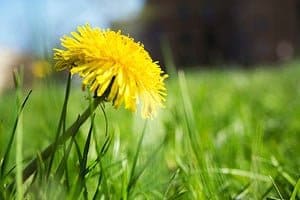
We’ve had lots of rain (and possibly more to come) in southern Ontario, and the soil is now nicely hydrated. There should be a few weeks in June when soil moisture and moderate temperatures favour fertilizing the lawn and dealing with weeds. Fertilizers need to be applied when soil is moist so that they can be dissolved and taken up by plant roots. Putting fertilizer on the lawn when the soil is dry can result in burned roots and a waste of expensive nutrients. If a hot and dry period arrives in July, we want the lawn to already be fat with its fertilizer meal, and strengthened to endure the harsh conditions ahead.
Weeds are growing at a great pace, you might have noticed. I’m certainly miles behind in getting after the yellow avens, which has leaped from the borders into the lawn, proliferating so enthusiastically that it’s more of a groundcover than a weed. No matter what unwanted indigenous plant you’re gnashing your teeth over, you might want to consider the new, friendly (to gardeners and the environment) weed killers. New herbicides based on 25% acetic acid solutions (by comparison, salad vinegar is about 6% acetic acid) knock down anything with green tissue. The sprayed plant may return in several weeks, and it can be knocked down again with a second application. This is an easy way to handle weeds in asphalt and brick pathways; in time, the weeds may be exhausted and not return at all. For weeds in lawns, another new herbicide utilizes a strong iron solution to kill weeds, but won’t kill grass. You can find both of these products in garden centres. Fight on!
